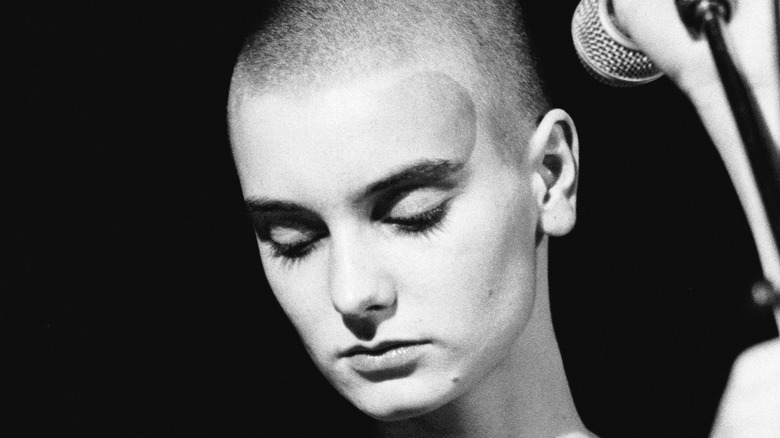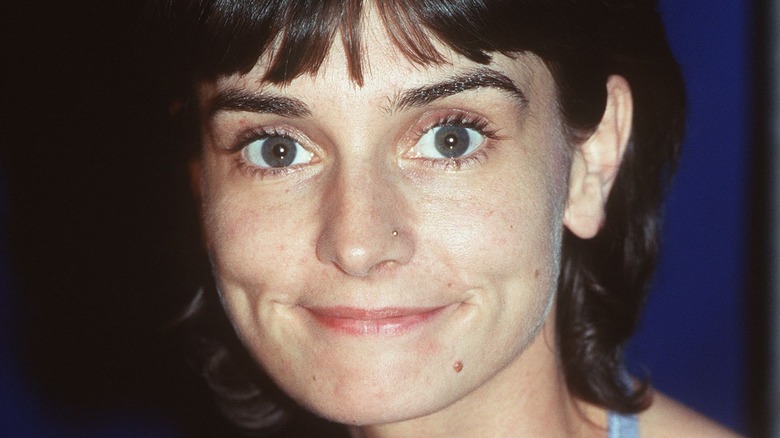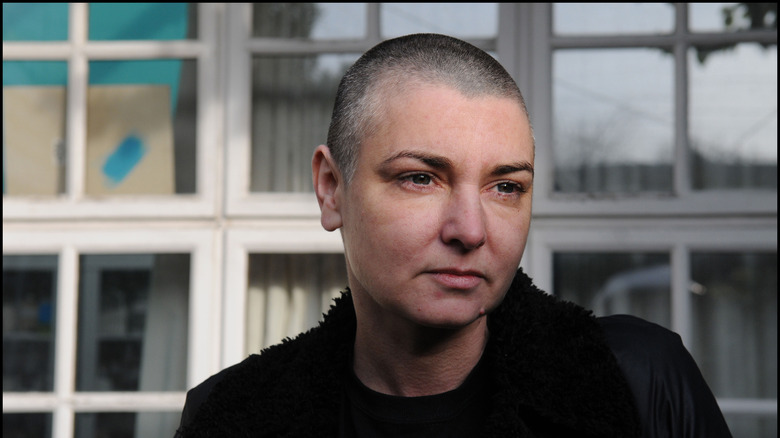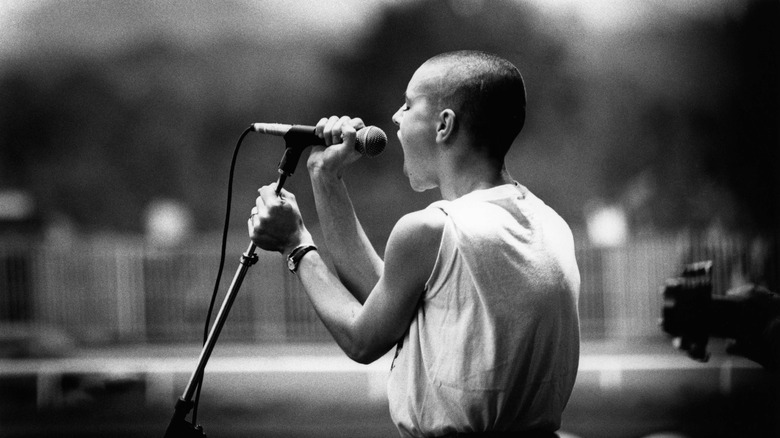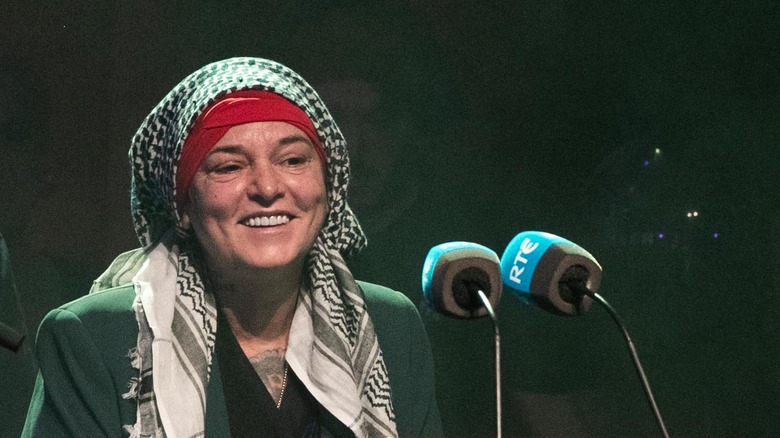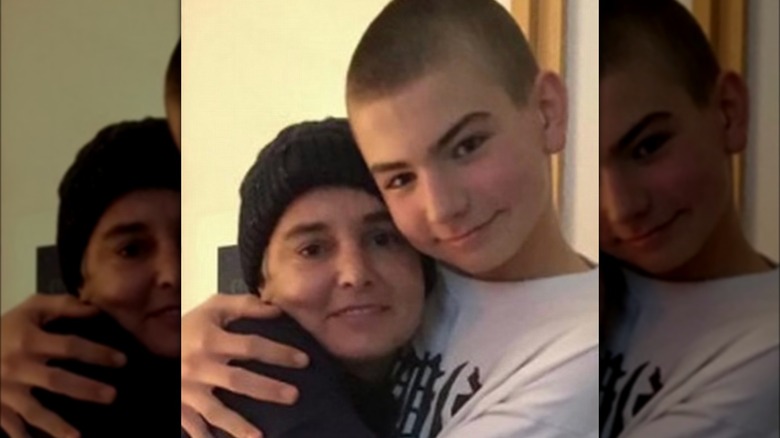The Tragic Real-Life Story Of Sinead O'Connor
In early 2022, Shane O'Connor, the son of Irish musician Sinéad O'Connor, died by suicide. Distraught, Sinead O'Connor was then hospitalized after a series of distressing tweets that have since been deleted, expressing the singer's own suicidal intentions, via CNN. These are just the latest examples, among many others, of the troubled singer's tragic real-life story, including public controversy and personal struggle beginning when she was only a child and ending when she died on July 26, 2023, at the age of 56.
Born and raised in Ireland, O'Connor's music career began in the 1980s with her debut album, "The Lion and the Cobra." Her most well-known work, however, came in the 1990s with "I Do Not Want What I Haven't Got," featuring the smash hit single, "Nothing Compares 2 U," penned by Prince. O'Connor stayed active as a recording artist up through 2014, but she never matched the critical or commercial acclaim she once enjoyed. Her work throughout the rest of her life was eclipsed by a tumultuous private life and a contentious public image.
She was institutionalized as a teenager
Sinéad O'Connor was born in 1966 in Dublin, Ireland. Her parents divorced when she was young, and she chose to live with her father. By the age of 15, she began shoplifting and was sent to one of Ireland's so-called "Magdalene Laundries," sometimes called "Magdalene Asylums." Most often, young women were sent to these institutions because they were pregnant, or engaged in what were perceived to be some other kind of anti-social behaviors, via The Washington Post.
In many respects, Sinéad O'Connor did well in the roughly year-and-a-half she spent in one of Ireland's Magdalene Laundries, run by the Roman Catholic Church. During this time, she received her first guitar from a nun, as O'Connor herself wrote in The Washington Post. But she also witnessed many instances of abuse at the hands of priests, although how much of this behavior was targeted at O'Connor remains unclear. Nevertheless, exposing abuse in the Roman Catholic Church became one of the singer's overwhelming missions in life, a theme recurring frequently after becoming an established musician. Further solidifying her break from the church, O'Connor converted to Islam in 2018, changing her name twice in the years between then and her death, but still performed as Sinéad O'Connor, via the Irish Post.
O'Connor's mother died when the singer was 19
Sinéad O'Connor may have not only witnessed child abuse in her time spent at one of Ireland's Magdalene Laundries, which purportedly included barbaric corporal punishments, psychological abuse, and sexual abuse, as the singer wrote in The Washington Post. She said she also experienced herself at the hands of her mother, who died in a car wreck when O'Connor was 19 years old, according to People Magazine.
As Sinéad O'Connor revealed to Dr. Phil in 2017, her mother, who experienced mental health and substance use disorder, abused her both physically and sexually, even forcing her to live outdoors in a shed for months at a time. O'Connor's mother, she said to Dr. Phil, "ran a torture chamber. She was a person who took delight and a smile in hurting you ... We used to be terrified." Looking back, O'Connor somehow managed to forgive her mom. "I hate not being able to take care of her, maybe give her some love back. And help her, nobody helped her," she said (via People).
She had beef with Madonna and Prince
Sinéad O'Connor was at the pinnacle of her professional career in 1992. As the musical guest on "Saturday Night Live," she set off a firestorm of controversy by tearing up a picture of Pope John Paul II as a means of protest against alleged abuses within the Catholic Church. This act quickly divided her audience, putting O'Connor on trial in the court of public opinion.
One voice joining the chorus of criticism was none other than the widely popular singer Madonna, who came down on the side of the Catholic Church. "I think there is a better way to present her ideas, rather than ripping up an image that means a lot to other people," she said, via The New York Times. "If she is against the Roman Catholic Church, and she has a problem with them, I think she should talk about it."
Sinéad O'Connor also had a rocky relationship with Prince, who wrote the singer's biggest hit to date, "Nothing Compares 2 U." The two nearly came to blows early on in her career. "We didn't get on at all. In fact, we had a punch-up," she told the Irish Independent in 2014. She also called Prince "a devil worshiper" in her 2021 memoir "Rememberings," according to the Irish Post. "I believe he was involved in devil business because an old girlfriend of his told me he had the power to make s*** move around the room," she said (via Irish Post).
She lived with fibromyalgia and possibly bipolar disorder
On top of personal trauma and professional controversy, Sinéad O'Connor managed physical and mental challenges. She reportedly had bouts with fibromyalgia, causing widespread musculoskeletal pain that's sometimes a result of stress, per Mayo Clinic, as well as bipolar disorder, characterized by dramatic peaks and valleys of hypomania and depression. After briefly retiring from music, O'Connor opened up to HARP Magazine about her experience with fibromyalgia, which she called a "chronic fatigue illness that painfully affects your muscles."
"When you get something like that it's a gift, actually, because you have to reassess your life," she said (via HARP Magazine). "It's purely stress-related, so you have to get out of your life the things that are taking your energy." As far as bipolar disorder, she told Oprah Winfrey in 2007 that she was diagnosed around 2003 after a suicide attempt, according to The Toronto Star. She was later told that she may in fact not be bipolar after further mental health evaluation, as Musicoholics reports.
She called her late son 'the lamp of my soul'
Over the course of her career, O'Connor put out 10 studio albums, but she never saw the same success that she did with her cover of Prince's "Nothing Compares 2 U." The Billboard Music Awards named it the No. 1 single in the world in 1990.
O'Connor's was a life of both struggle and great success, but the devastating loss of her son was something she never recovered from. Besides the crushing blow of having her 17-year-old take his own life, it happened after he escaped from a psychiatric hospital where he was on suicide watch.
In a Twitter post from July 17, just about 10 days before her death was reported, she wrote, "Been living as undead night creature since. He was the love of my life, the lamp of my soul. We were one soul in two halves. He was the only person who ever loved me unconditionally. I am lost in the bardo without him."
If you or someone you know is struggling or in crisis, help is available. Call or text 988 or chat 988lifeline.org
